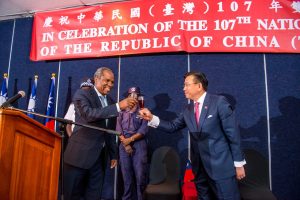China’s campaign to internationally isolate Taiwan continues in 2020. Weeks after President Tsai Ing-wen’s decisive reelection in the island’s January 2020 elections, China’s ambassador to South Africa has sent a statement to the African nation of Eswatini (formerly Swaziland) threatening to impose economic pressure on the country lest it drop its diplomatic recognition of Taipei for Beijing, the South African newspaper Daily Maverick reported this week. Eswatini is the sole African country that maintains official diplomatic ties with Taiwan and one of just 15 countries worldwide to do so.
According to the Daily Maverick report, Lin Songtian, Beijing’s envoy to South Africa, sent a letter to Eswatini saying “no diplomatic relations, no more business benefits.” According to Lin’s letter, Eswatini citizens wishing to travel to China were forced to apply for visas at a single point: the Chinese embassy in Pretoria, the South African capital. “Such an embarrassing situation is the result of Eswatini defying the One-China Principle and maintaining so-called ‘diplomatic ties’ with the Taiwan authorities, a province of the PRC,” Lin is reported to have written.
Relations between Beijing and Taipei entered a chill after Tsai Ing-wen and the independence-leaning Democratic Progressive Party won in the January 2016 elections in Taiwan. Following that victory, a “truce” that had prevailed between Taipei and Beijing during the presidency of the Kuomintang’s Ma Ying-jeou collapsed. Several countries broke diplomatic ties with Taipei as a result of Chinese pressure. In 2016, Sao Tome and Principe ended its recognition of Taiwan. In 2017, Panama, a major Taiwanese partner in Central America, followed.
In 2018, the Dominican Republic and Burkina Faso, the last African state to recognize Taiwan apart from Eswatini, followed. In 2019, in a single week, both the Solomon Islands and Kiribati ended diplomatic relations with Taipei, leaving Taiwan with just 15 countries that recognize it. Both Taipei and Beijing maintain diplomatic ties with an exclusive set of countries.
Where the previous Ma administration and the Kuomintang acknowledged the so-called “1992 consensus” between Beijing and Taipei, which referred to a cross-strait understanding on “One China,” Tsai and the DPP have not endorsed the concept. Tsai has not endorsed Beijing’s understanding of the “One China” principle, as a result, leading to additional diplomatic pressure from China on countries that recognize Taiwan.
According to the Daily Maverick report, China’s move to impose pressure on Eswatini began shortly after Tsai’s election victory on January 11. That suggests that Beijing had planned for Eswatini to be next on its pressure campaign to isolate Taipei. It’s unclear how the government of Eswatini, an absolute monarchy, will move on its diplomatic ties with Taiwan.
Earlier this month, Taipei reiterated that its ties with Eswatini remained on firm footing. “Eswatini has reiterated its firm intentions to deepen its diplomatic relations with Taiwan, even in the face of pressure from China,” Joanne Ou, a spokesperson for the Taiwanese Ministry of Foreign Affairs, said in a statement.

































